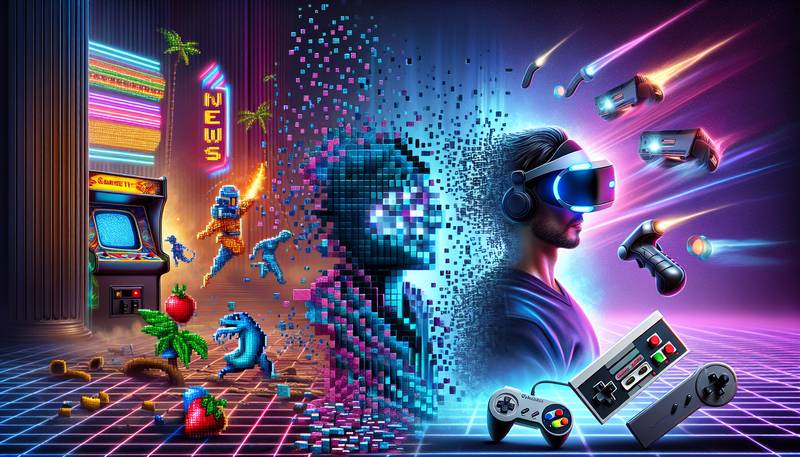The Evolution of Gaming: From Arcade to Virtual Reality

Gaming has come a long way since the days of simple arcade games like Pong and Pac-Man. Today, we have immersive virtual reality experiences that transport us into entirely new worlds. The evolution of gaming has been a fascinating journey, and it's one that continues to push the boundaries of technology and entertainment.
The Early Days of Gaming
The first video game is often credited to physicist William Higinbotham, who created a simple tennis game called Tennis for Two in 1958. However, it wasn't until the 1970s that video games began to gain popularity with the release of arcade games like Pong and Space Invaders. These games were simple but addictive, and they quickly became a cultural phenomenon.
"Video games are bad for you? That's what they said about rock and roll." - Shigeru Miyamoto, creator of Mario and Zelda
Arcade games were a social experience, with players gathering around machines to compete for high scores. The success of these games led to the development of home consoles like the Atari 2600, which allowed people to play games in the comfort of their own homes.
The Rise of Home Consoles and PC Gaming
The 1980s saw the rise of home consoles like the Nintendo Entertainment System (NES) and the Sega Genesis. These consoles brought gaming into the mainstream, with iconic games like Super Mario Bros. and Sonic the Hedgehog. Meanwhile, PC gaming was also taking off, with games like Doom and Quake pushing the boundaries of what was possible with computer graphics.
The 1990s saw the introduction of 3D graphics with the release of the Sony PlayStation and the Nintendo 64. These consoles brought a new level of realism to gaming, with games like Tomb Raider and Super Mario 64 offering immersive 3D environments to explore.
The Arrival of Online Gaming
The turn of the century saw the arrival of online gaming, with the release of the Sega Dreamcast and the PlayStation 2. These consoles introduced online capabilities, allowing players to compete against each other from anywhere in the world. Games like Halo and Call of Duty became cultural phenomenons, with millions of players logging on to play every day.
Online gaming also gave rise to the phenomenon of eSports, with professional gamers competing in tournaments for cash prizes. Games like League of Legends and Overwatch have become major eSports, with millions of fans tuning in to watch the action.
The Rise of Mobile Gaming
The rise of smartphones and tablets has also had a major impact on the gaming industry. Mobile gaming has become a multi-billion dollar industry, with games like Candy Crush and Angry Birds becoming household names. The convenience of being able to play games on the go has made mobile gaming incredibly popular, with millions of people playing games on their phones every day.
Mobile gaming has also introduced new business models, with many games being free-to-play with in-app purchases. This has allowed game developers to reach a much wider audience, with games like Fortnite and Clash of Clans becoming incredibly successful.
The Arrival of Virtual Reality
The latest frontier in gaming is virtual reality (VR). VR headsets like the Oculus Rift and HTC Vive offer truly immersive gaming experiences, with players able to move around and interact with virtual environments. Games like Beat Saber and Half-Life: Alyx offer incredible VR experiences, and the technology is still in its infancy.
VR gaming has the potential to revolutionize the gaming industry, with players able to step into the shoes of their favorite characters and experience games in a whole new way. The possibilities are endless, and it's an exciting time for gamers and developers alike.
The Future of Gaming
The future of gaming is looking brighter than ever, with new technologies like augmented reality (AR) and cloud gaming on the horizon. AR games like Pokemon Go have already shown the potential of the technology, and cloud gaming services like Google Stadia and Xbox Game Pass are making it easier than ever to play games without the need for expensive hardware.
As technology continues to advance, we can only imagine what the future of gaming will look like. One thing is for sure: the evolution of gaming is far from over, and we can't wait to see what's next.
Conclusion
The evolution of gaming has been a journey of innovation and creativity. From the simple arcade games of the 1970s to the immersive virtual reality experiences of today, gaming has come a long way. As technology continues to advance, the possibilities for gaming are endless, and we can't wait to see what the future holds for this exciting industry.


